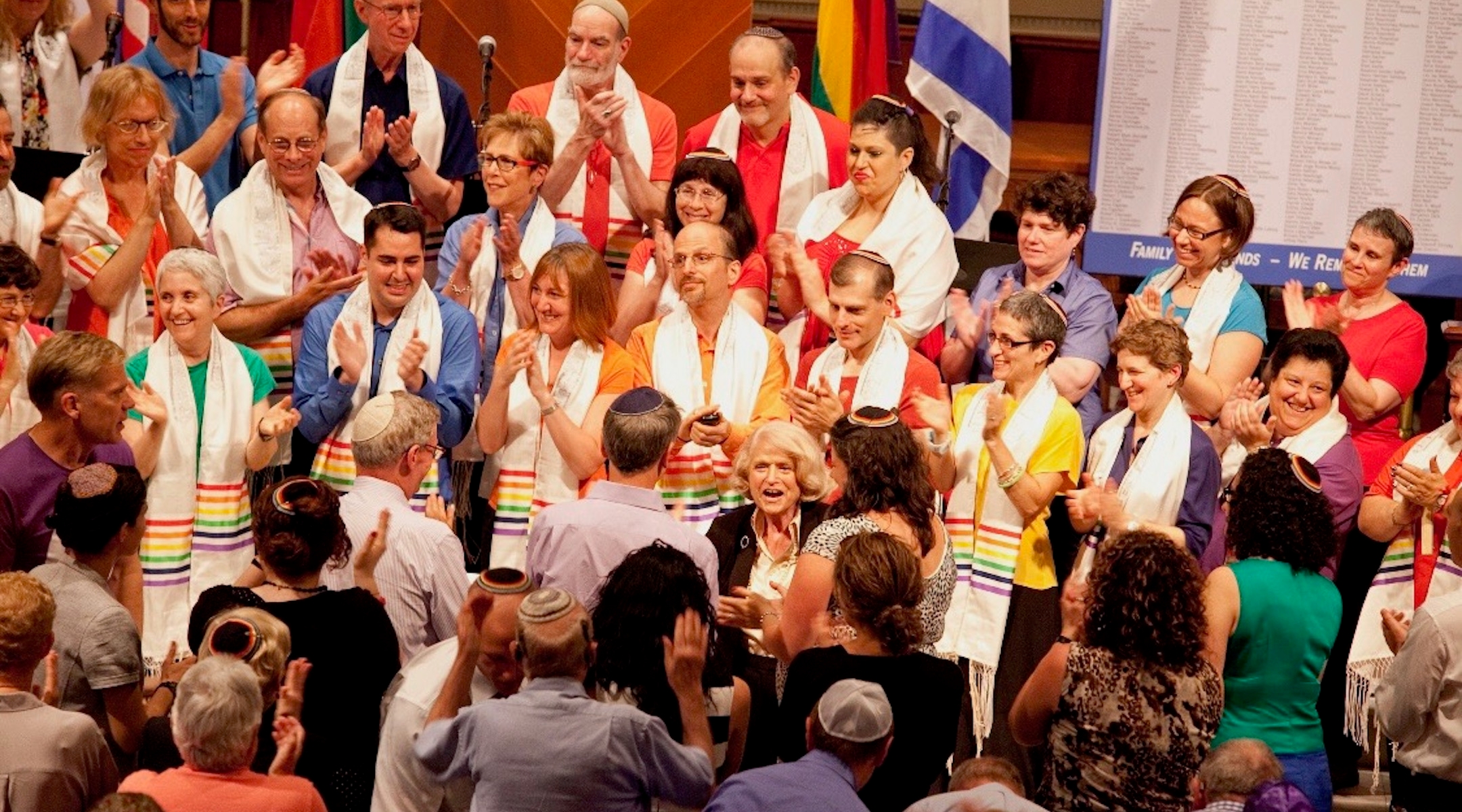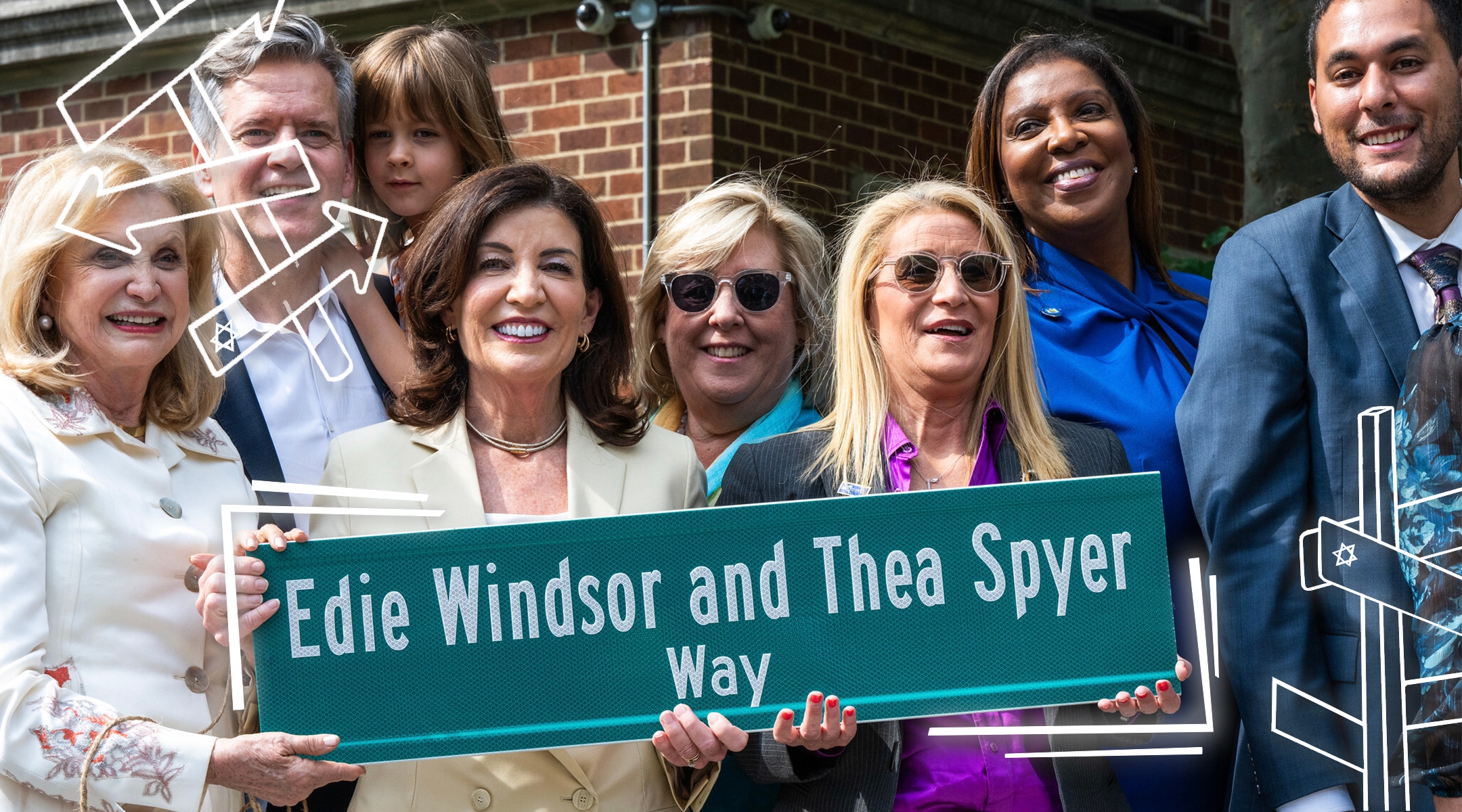Editor’s note: This article is the first in a new series, Sign Post, which explores street signs and other locations around the city that are named in honor of Jewish New Yorkers.
(New York Jewish Week) — Edie Windsor and Thea Spyer — whose marriage wasn’t recognized by the federal government, sparking a 2013 lawsuit that led to a landmark legal victory for same-sex marriage — were a fixture in Greenwich Village, where they lived for 43 years.
On June 20, New York City honored the Jewish couple by co-naming Fifth Avenue and Washington Square North — the intersection where they lived — “Edie Windsor and Thea Spyer Way.”
“Today is about love, the story of love — a love that started in this place in 1963 called Greenwich Village. And since that time, how many people have been able to fall in love and to marry the person they wanted to?” said New York Gov. Kathy Hochul in a speech at the dedication. “It was tough for a lot of people for a long time. I’m so proud to live at a time where, at least in our state, we celebrate.”
“We think about phrases like ‘Happy Pride,’” she added. “That’s not just the month of June — we want ‘pride’ to be a statement of who we are 365 days a year. We always want to be happy and proud and out. That’s who we are as New Yorkers.”
The renaming of the intersection was passed unanimously by the Manhattan Community Board 2 in April 2022.
Windsor and Spyer met in 1963 and began dating in 1965. They remained together for 44 years, marrying in 2007 in Canada — where same-sex marriage was legalized in July 2005. When Spyer died at age 77 in 2009, Windsor was set to inherit Spyer’s estate — but she was required to pay $363,053 in federal estate taxes because the U.S government did not recognize their union. (That amount would have been $0 had the government recognized same-sex marriage.)
Windsor filed a lawsuit against the U.S. government seeking a refund. Her case, United States vs. Windsor, went to the Supreme Court, where a 5-4 majority decided in 2013 that the 1996 Defense of Marriage Act, denying federal benefits to partners of gay people, was unconstitutional. The ruling helped pave the way for the 2015 ruling that federally recognized all same-sex marriages.
“Because of today’s Supreme Court ruling, the federal government can no longer discriminate against the marriages of gay and lesbian Americans,” Windsor said in a statement at the time. “Children born today will grow up in a world without DOMA…. Those same children who happen to be gay will be free to love and get married — as Thea and I did — but with the same federal benefits, protections and dignity as everyone else.”
Both Windsor, who grew up in Philadelphia, and Spyer, who grew up in the Netherlands, were active members of New York’s Congregation Beit Simchat Torah, the pioneering LGBTQ synagogue that’s celebrating its 50th anniversary this year.

Edie Windsor at Shabbat services at Congregation Beit Simchat Torah the weekend after the landmark Supreme Court decision, June 29, 2013. (Courtesy Sharon Kleinbaum)
“I am thrilled that our member Edie Windsor and her wife Thea are being honored this way,” Sharon Kleinbaum, the senior rabbi at CBST, told the New York Jewish Week.
After the Supreme Court case was ruled in Windsor’s favor, the activist attended a packed Shabbat service at CBST, where her lawyer, Roberta Kaplan, also a member there, gave a sermon. “Inherent in Jewish belief is the view that people, communities and even the law must and should change when times and ethical circumstances require it,” Kaplan said on June 29, 2013. “Indeed, both the Torah and the rabbis teach that such change is actually a positive value.”
Windsor and Spyer were also active members of SAGE, an advocacy organization for LGBTQ seniors, and the LGBT Community Center in the West Village.
Windsor, who worked as a technology manager and programmer at IBM before founding her own software development consultancy, was remarried to Judith Kasen for just one year before Windsor died in 2017 at 88. June 20, the day of the street renaming dedication, would have been Windsor’s 94th birthday.
“Sometimes it takes people of courage to stand up against the forces of their time, and that’s exactly what Edie did in manifestation of her love to Thea,” said Hochul, who added she had personally known Windsor. “The legacy has been created and that legacy will continue to shine on as a reminder of what tough people — tough New Yorkers, tough women — are capable of doing. So their story will live on through this unveiling.”
Other local and state politicians attended the dedication last Tuesday, including Attorney General Letitia James, State Senator Brad Hoylman-Sigal, City Council members Erik Bottcher and Carlina Rivera, Assembly member Rebecca Seawright, former U.S. Rep. Carolyn Maloney and Executive Director of the LGBT Center Glennda Testone.
The New York Jewish Week brings you the stories behind the headlines, keeping you connected to Jewish life in New York. Help sustain the reporting you trust by donating today.





